General, Sir John Monash, Personal Files Book 22, 2 January - 1 February 1919- Part 4
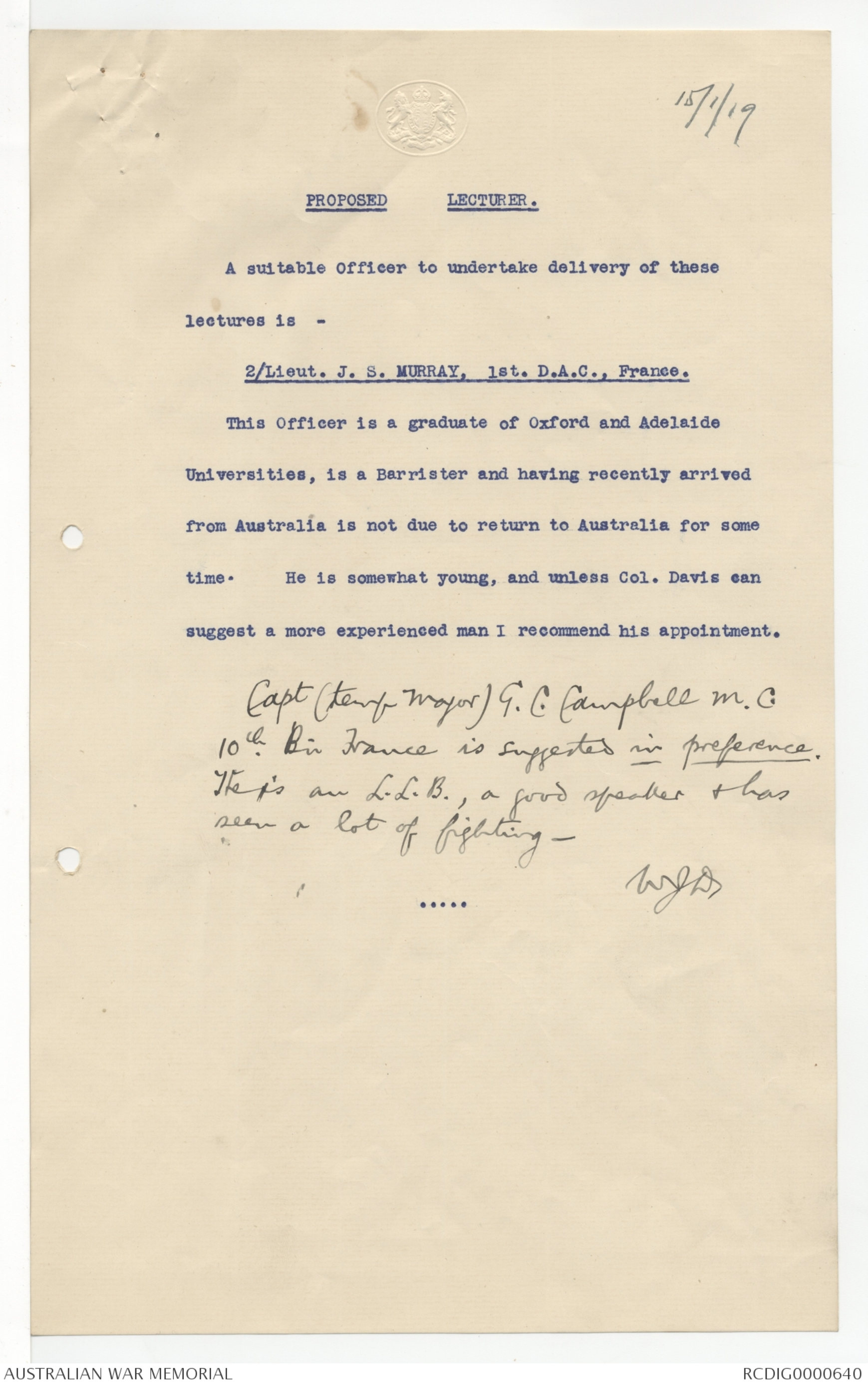
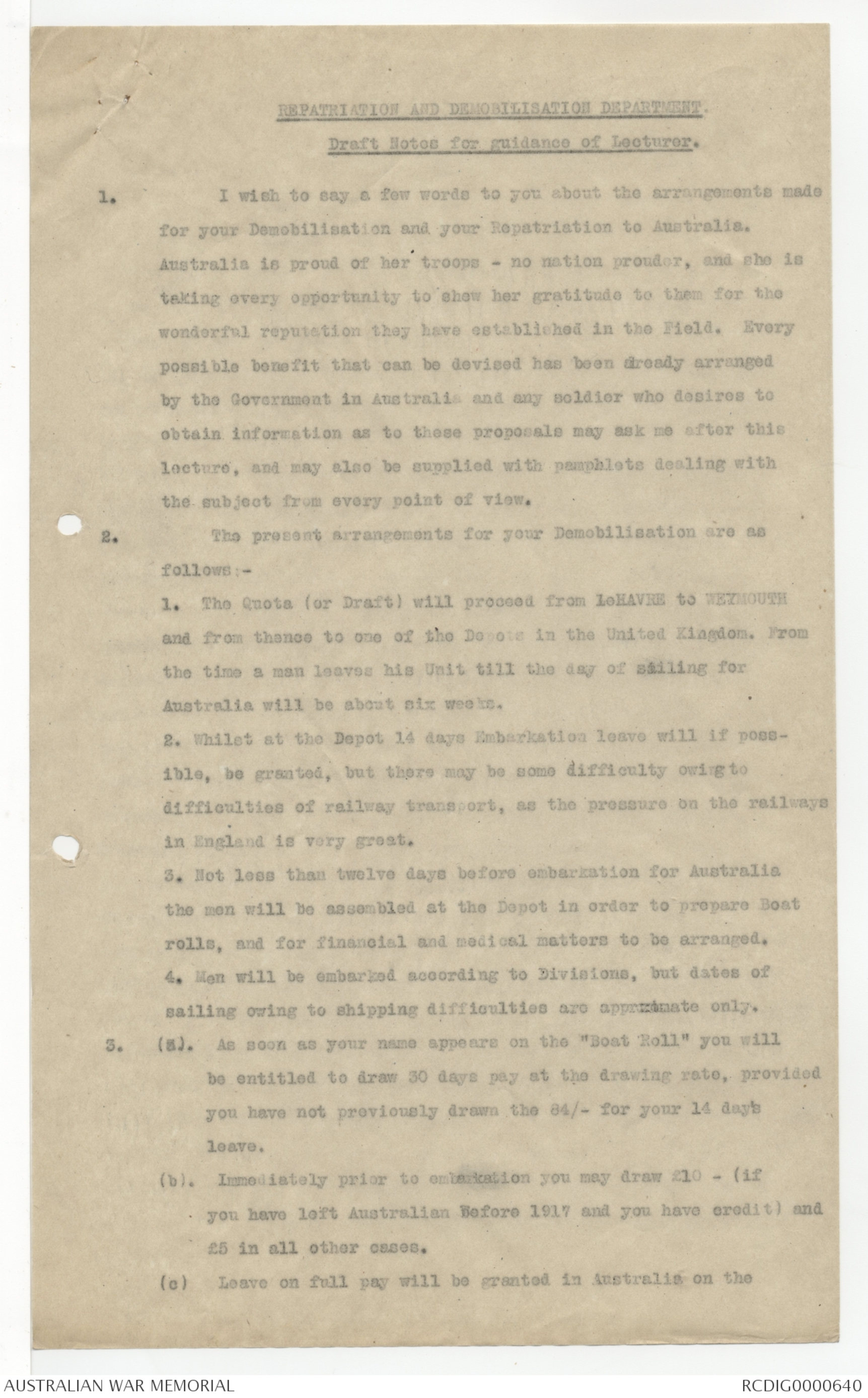
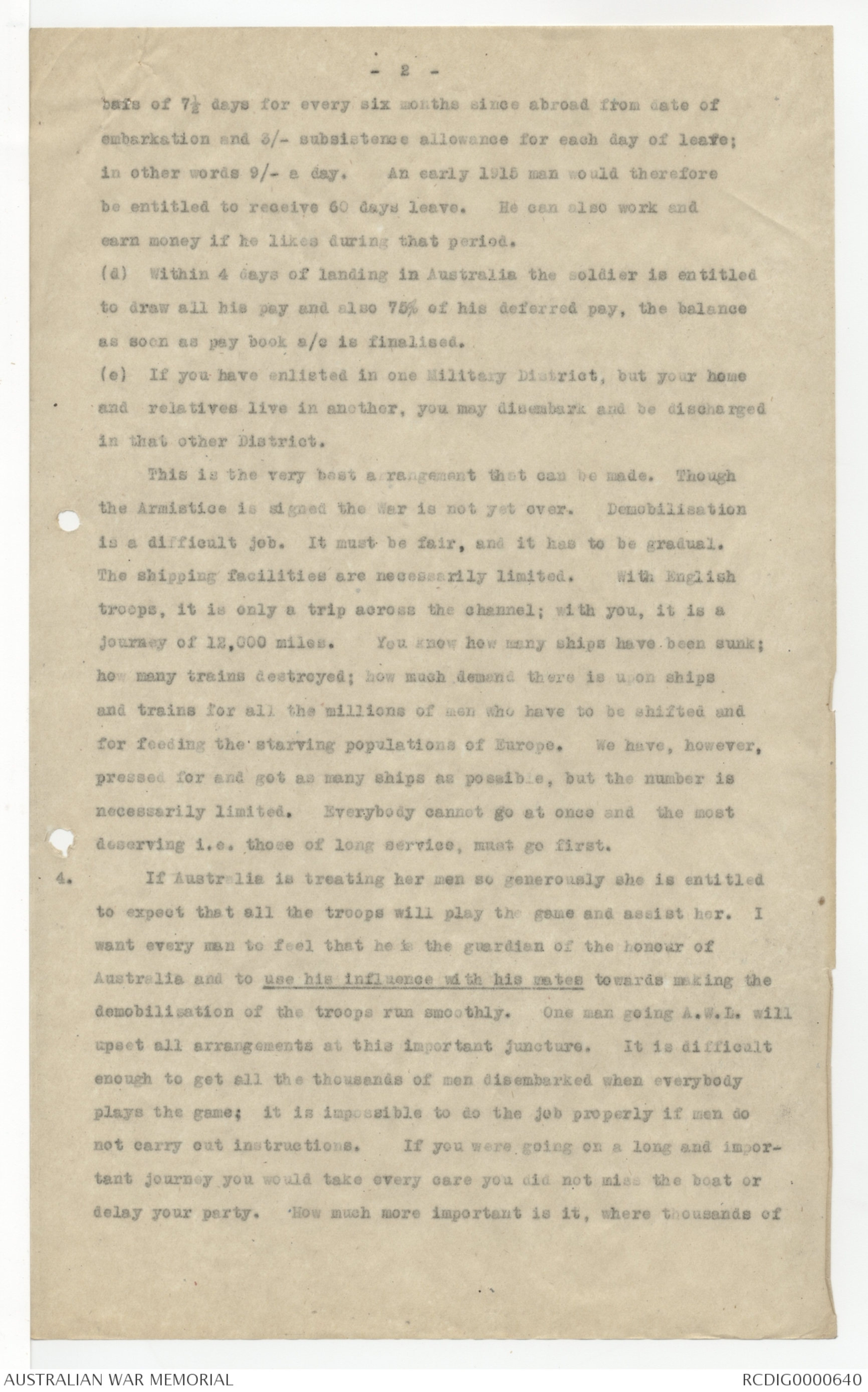
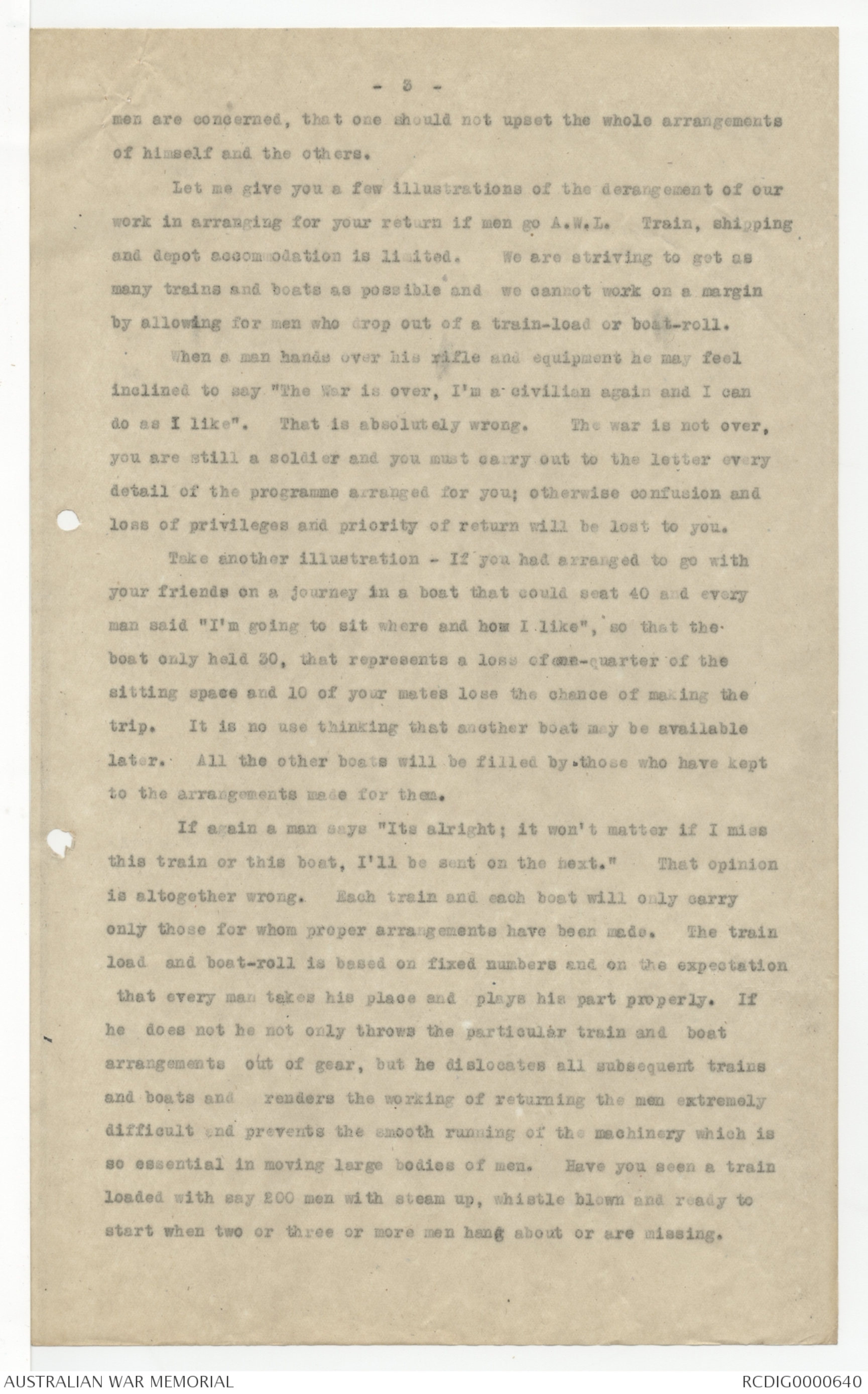
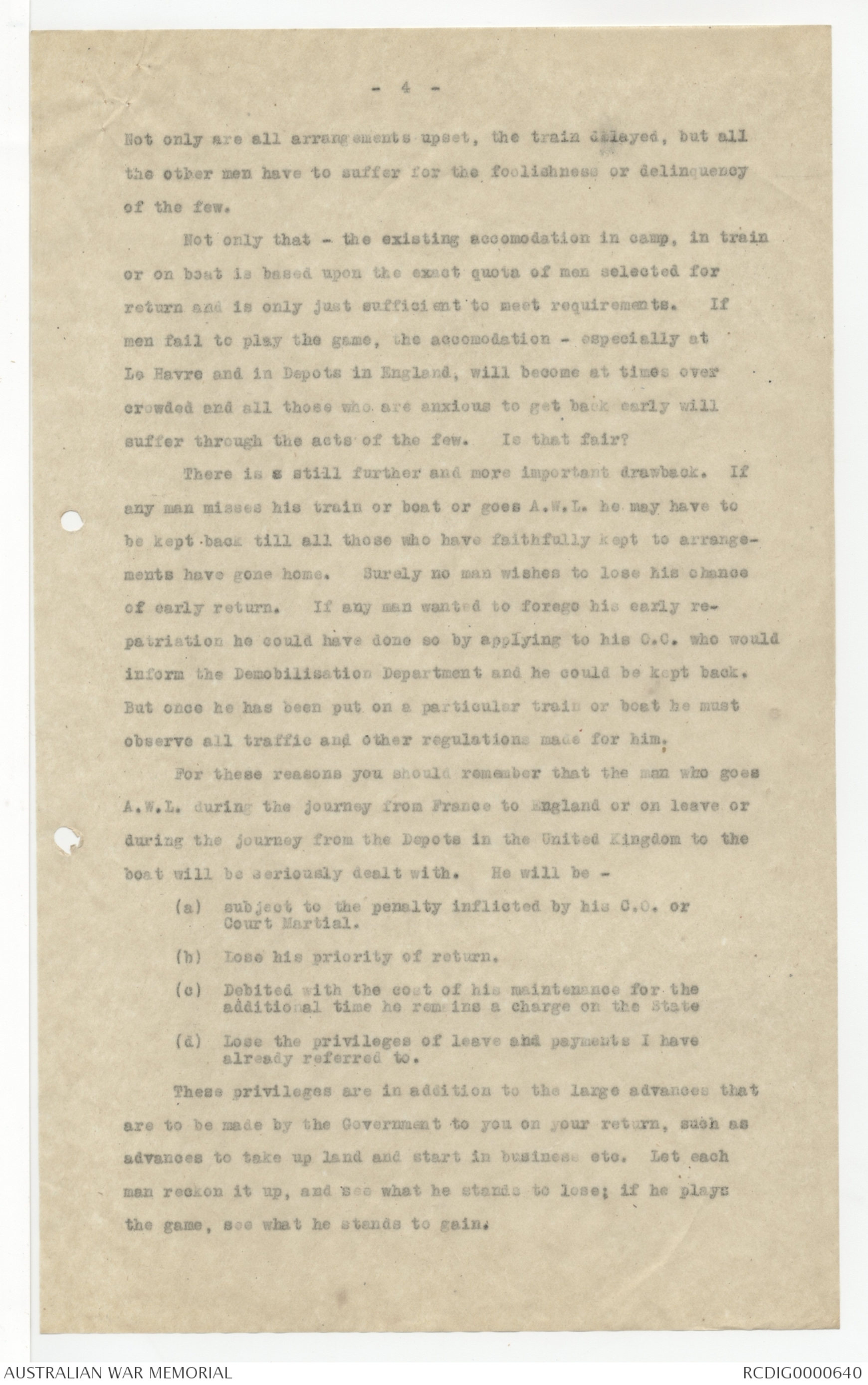
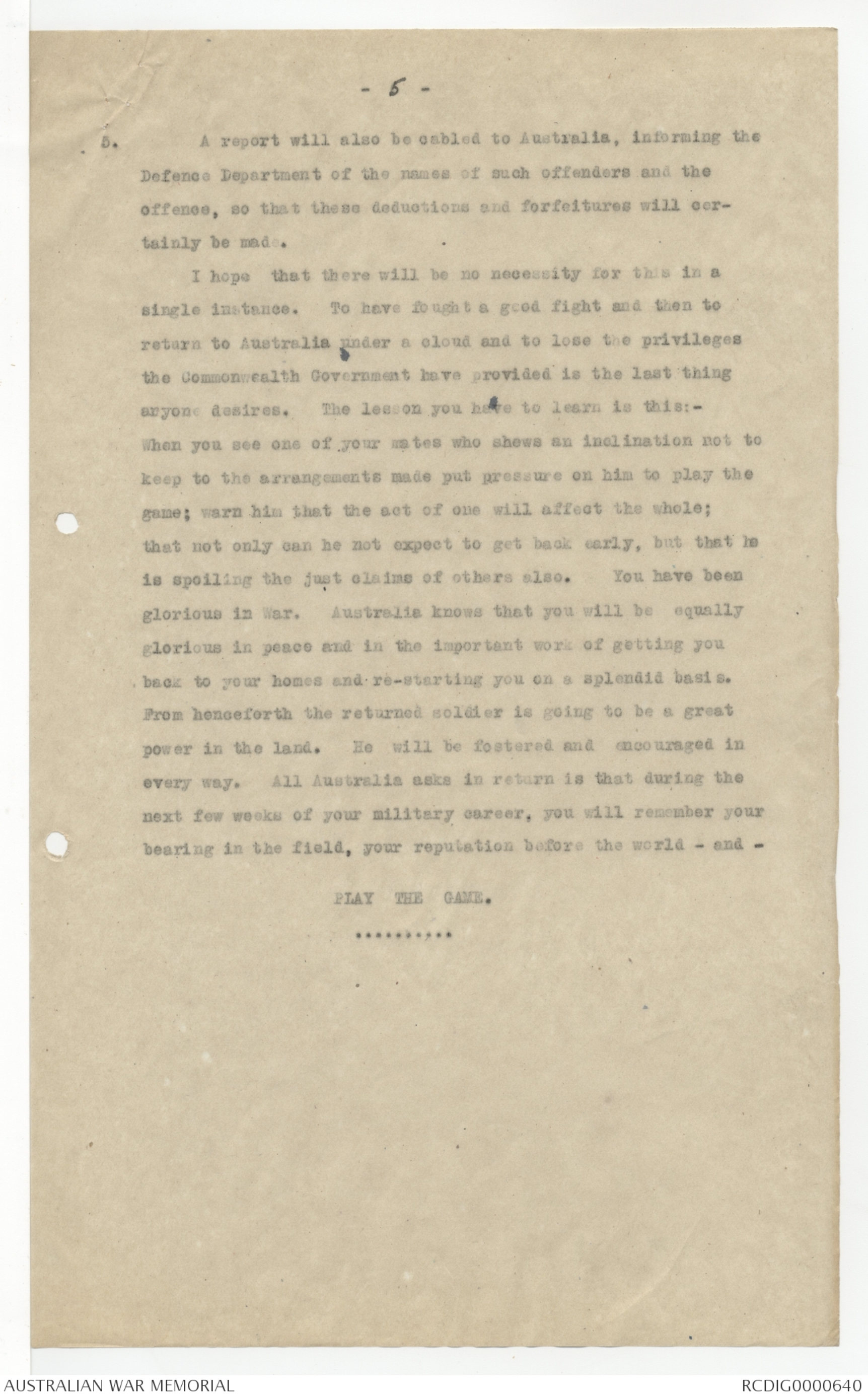
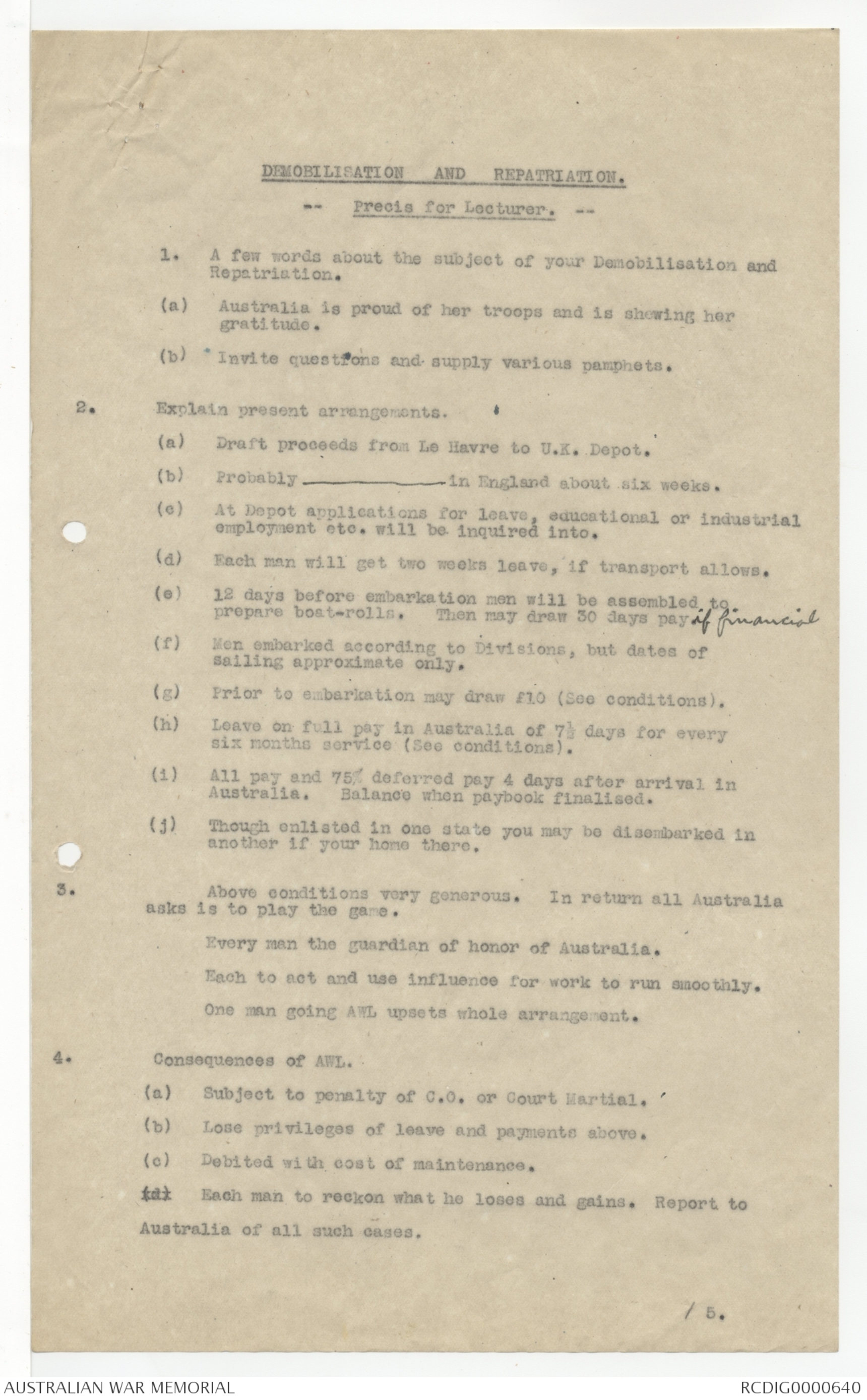
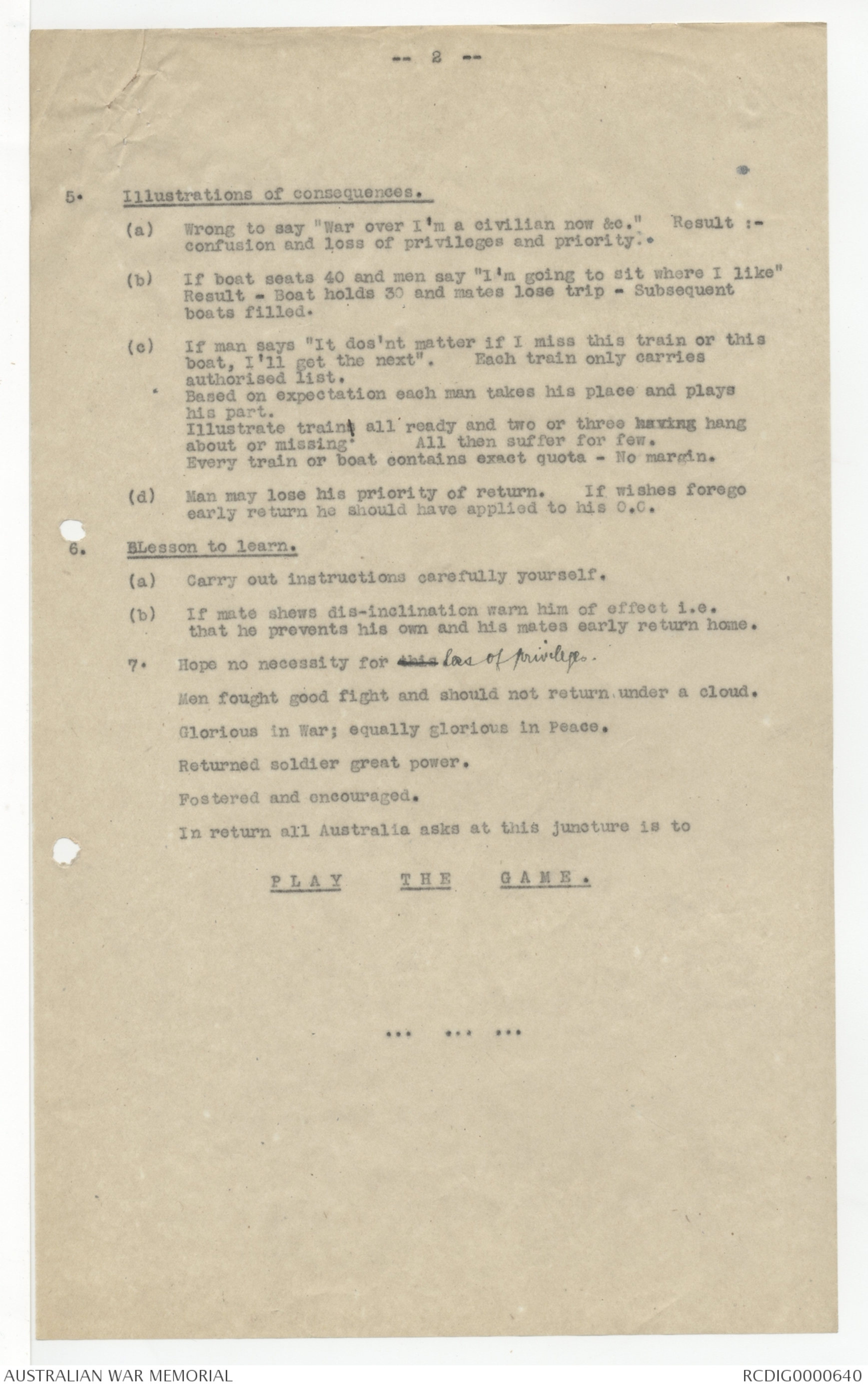
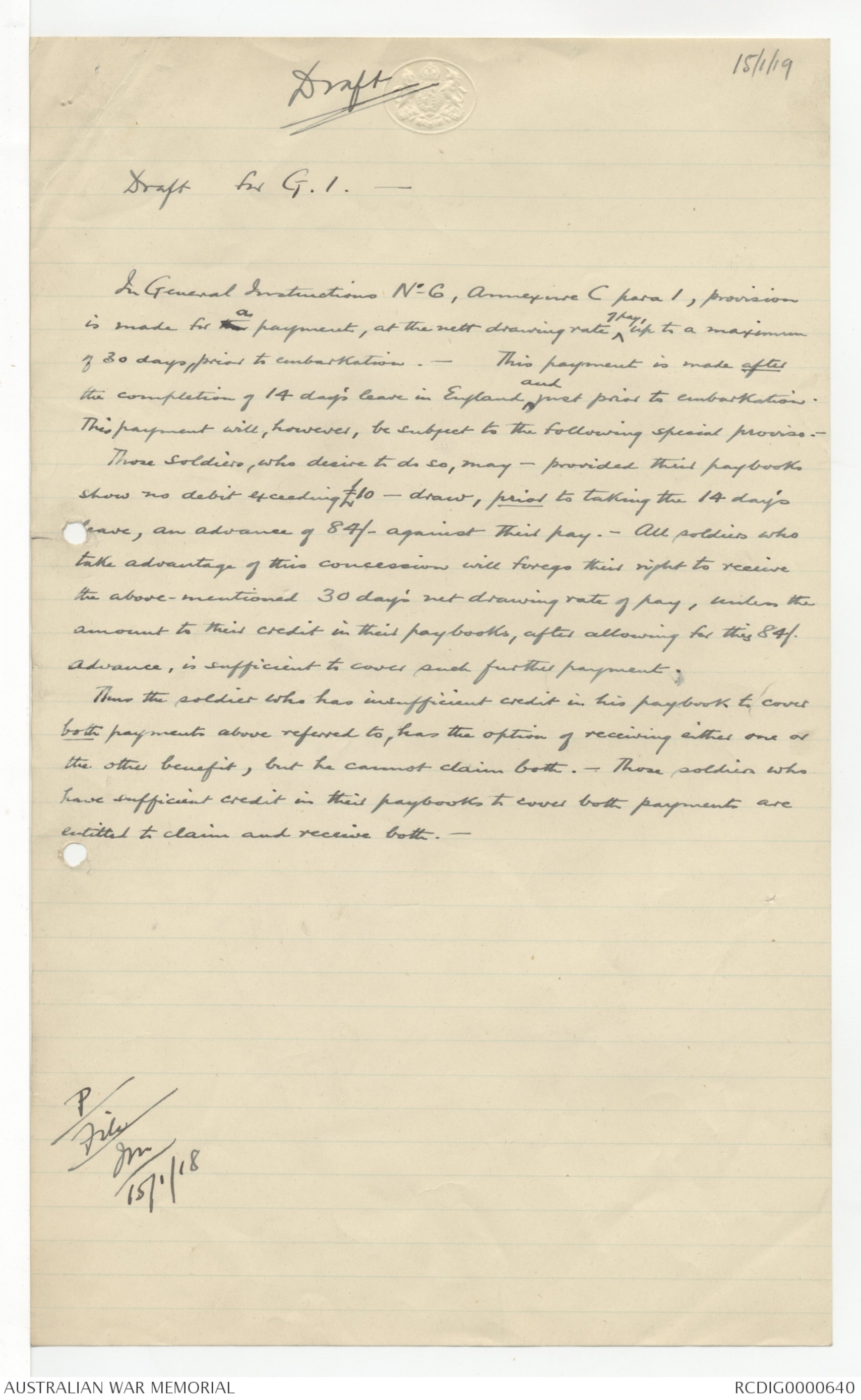
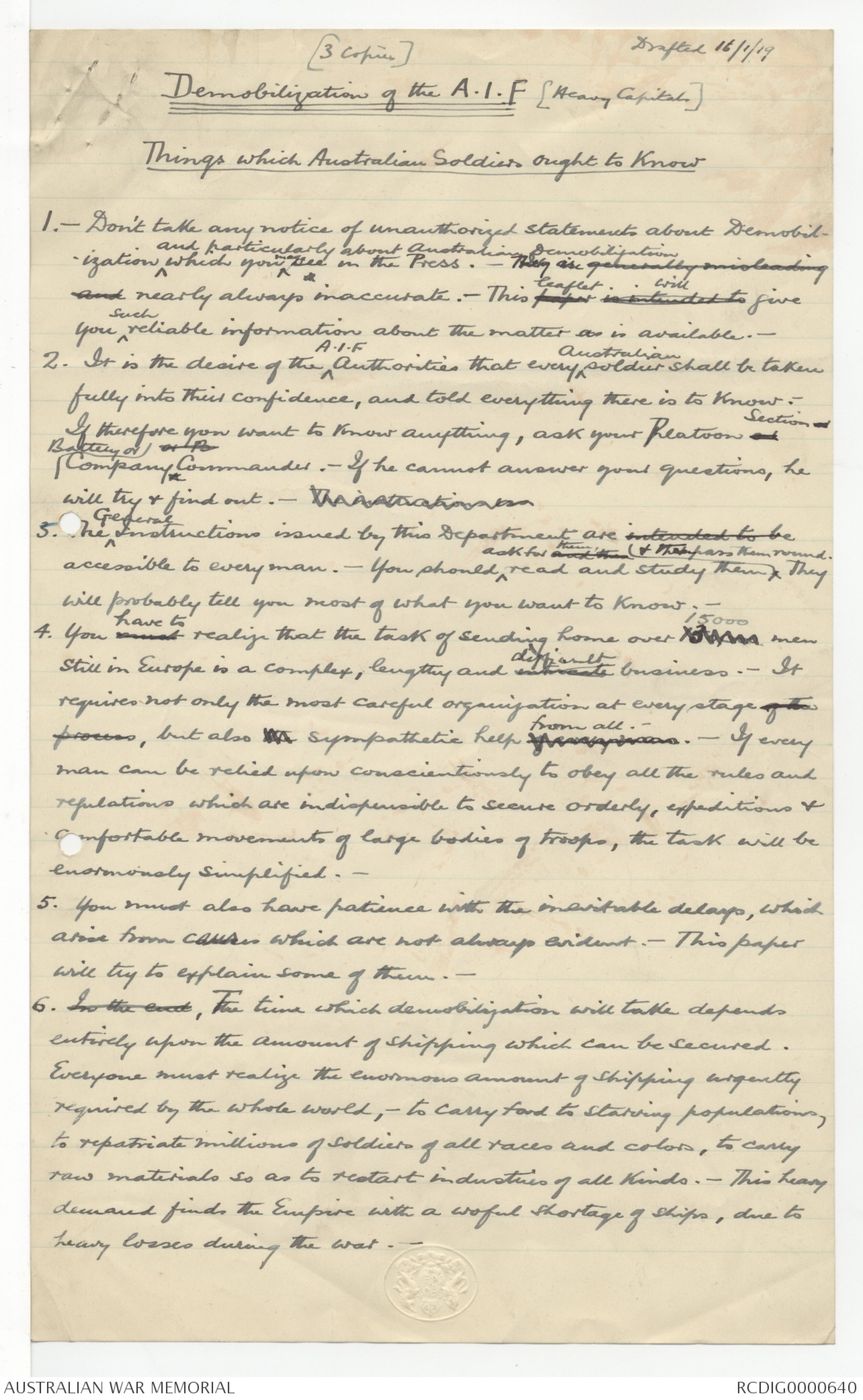
15/1/19
PROPOSED LECTURER.
A suitable Officer to undertake delivery of these
lectures is -
2/Lieut. J. S. MURRAY, 1st. D.A.C., France.
This Officer is a graduate of Oxford and Adelaide
Universities, is a Barrister and having recently arrived
from Australia is not due to return to Australia for some
time. He is somewhat young, and unless Col. Davis can
suggest a more experienced man I recommend his appointment.
Capt (temp Major) G. C. Campbell M.C.
10th Bn France is suggested in preference.
He is an L.L.B., a good speaker & has
seen a lot of fighting -
W J D
REPATRIATION AND DEMOBILISATION DEPARTMENT.
Draft Notes for guidance of Lecturer.
1. I wish to say a few words to you about the arrangements made
for your Demobilisation and your Repatriation to Australia.
Australia is proud of her troops - no nation prouder, and she is
taking every opportunity to show her gratitude to them for the
wonderful reputation they have established in the Field. Every
possible benefit that can be devised has been already arranged
by the Government in Australia and any soldier who desires to
obtain information as to these proposals may ask me after this
lecture, and may also be supplied with pamphlets dealing with
the subject from every point of view.
2. The present arrangements for your Demobilisation are as
follows:-
1. The Quota (or Draft) will proceed from LeHAVRE to WEYMOUTH
and from thence to one of the Depots in the United Kingdom. From
the time a man leaves his Unit till the day of sailing for
Australia will be about 6 weeks.
2. Whilst at the Depot 14 days Embarkation leave will if possible,
be granted, but there may be some difficulty owing to
difficulties of railway transport, as the pressure on the railways
in England is very great.
3. Not less than twelve days before embarkation for Australia
the men will be assembled at the Depot in order to prepare Boat
rolls, and for financial and medical matters to be arranged.
4. Men will be embarked according to Divisions, but dates of
sailing owing to shipping difficulties are approximate only.
3. (a). As soon as your name appears on the "Boat Roll" you will
be entitled to draw 30 days pay at the drawing rate, provided
you have not previously drawn the 84/- for your 14 days
leave.
(b). Immediately prior to embarkation you may draw £10 - (if
you have left Australian Before 1917 and you have credit) and
£5 in all other cases.
(c) Leave on full pay will be granted in Australia on the
- 2 -
[[basis?]] of 7½ days for every six months since abroad from date of
embarkation and 3/- subsistence allowance for each day of leave;
in other words 9/- a day. An early 1915 man would therefore
be entitled to receive 60 days leave. He can also work and
earn money if he likes during that period.
(a) Within 4 days of landing in Australia the soldier is entitled
to draw all his pay and also 75% of his deferred pay, the balance
as soon as pay book a/c is finalised.
(e) If you have enlisted in one Military District, but your home
and relatives live in another, you may disembark and be discharged
in that other District.
This is the very best arrangement that can be made. Though
the Armistice is signed the War is not yet over. Demobilisation
is a difficult job. It must be fair, and it has to be gradual.
The shipping facilities are necessarily limited. With English
troops, it is only a trip across the channel; with you, it is
journey of 12,000 miles. You know how many ships have been sunk;
how many trains destroyed; how much demand there is upon ships
and trains for all the millions of men who have to be shifted and
for feeding the starving populations of Europe. We have, however,
pressed for and got as many ships as posibie, but the number is
necessarily limited. Everybody cannot go at once and the most
deserving i.e. those of long service, must go first.
4. If Australia is treating her men so generously she is entitled
to expect that all the troops will play the game and assist her. I
want every man to feel that he is the guardian of the honour of
Australia and to use his influence with his mates towards making the
demobilisation of the troops run smoothly. One man going A.W.L. will
upset all arrangements at this important juncture. It is difficult
enough to get all the thousands of men disembarked when everybody
plays the game; it is impossible to do the job properly if men do
not carry out instructions. If you were going on a long and important
journey you would take every care you did not miss the boat or
delay your party. How much more important is it, where thousands of
- 3 -
men are concerned, that one should not upset the whole arrangements
of himself and the others.
Let me give you a few illustrations of the derangement of our
work in arranging for your return if men go A.W.L. Train, shipping
and depot accommodation is limited. We are striving to get as
many trains and boats as possible and we cannot work on a margin
by allowing for men who drop out of a train-load or boat-roll.
When a man hands over his rifle and equipment he may feel
inclined to say "The War is over, I'm a civilian again and I can
do as I like". That is absolutely wrong. The war is not over,
you are still a soldier and you must carry out to the letter every
detail of the programme arranged for you; otherwise confusion and
loss of privileges and priority of return will be lost to you.
Take another illustration - If you had arranged to go with
your friends on a journey in a boat that could seat 40 and every
man said "I'm going to sit where and how I like", so that the
boat only held 30, that represents a loss of one- quarter of the
sitting space and 10 of your mates lose the chance of making the
trip. It is no use thinking that another boat may be available
later. All the other boats will be filled by those who have kept
to the arrangements made for them.
If again a man says "Its alright; it won't matter if I miss
this train or this boat, I'll be sent on the next." That opinion
is altogether wrong. Each train and each boat will only carry
only those for whom proper arrangements have been made. The train
load and boat-roll is based on fixed numbers and on the expectation
that every man takes his place and plays his part properly. If
he does not he not only throws the particular train and boat
arrangements out of gear, but he dislocates all subsequent trains
and boats and renders the working of returning the men extremely
difficult and prevents the smooth running of the machinery which is
so essential in moving large bodies of men. Have you seen a train
loaded with say 200 men with steam up, whistle blown and ready to
start when two or three or more men hang about or are missing.
- 4 -
Not only are all arrangements upset, the train delayed, but all
the other men have to suffer for the foolishness or delinquency
of the few.
Not only that - the existing accommodation in camp, in train
or on boat is based upon the exact quota of men selected for
return and is only just sufficient to meet requirements. If
men fail to play the game, the accommodation - especially at
Le Havre and in Depots in England, will become at times over
crowded and all those who are anxious to get back early will
suffer through the acts of the few. Is that fair?
There is a still further and more important drawback. If
any man misses his train or boat or goes A.W.L. he may have to
be kept back till all those who have faithfully kept to arrangements
have gone home. Surely no man wishes to lose his chance
of early return. If any man wanted to forego his early repatriation
he could have done so by applying to his C.C. who would
inform the Demobilisation Department and he could be kept back.
But once he has been put on a particular train or boat he must
observe all traffic and other regulations made for him.
For these reasons you should remember that the man who goes
A.W.L. during the journey from France to England or on leave or
during the journey from the Depots in the United Kingdom to the
boat will be seriously dealt with. He will be -
(a) subject to the penalty inflicted by his C.O. or
Court Martial.
(b) Lose his priority of return.
(c) Debited with the cost of his maintenance for the
additional time he remains a charge on the State.
(d) Lose the privileges of leave and payments I have
already referred to.
These privileges are in addition to the large advances that
are to be made by the Government to you on your return, such as
advances to take up land and start in business etc. Let each
man reckon it up, and see what he stands to lose; if he plays
the game, see what he stands to gain.
- 5 -
5. A report will also be cabled to Australia, informing the
Defence Department of the names of such offenders and the
offence, so that these deductions and forfeitures will certainly
be made.
I hope that there will be no necessity for this in a
single instance. To have fought a good fight and then to
return to Australia under a cloud and to lose the privileges
the Commonwealth Government have provided is the last thing
anyone desires. The lesson you have to learn is this:-
When you see one of your mates who shows an inclination not to
keep to the arrangements made put pressure on him to play the
game; warn him that the act of one will affect the whole;
that not only can he not expect to get back early, but that he
is spoiling the just claims of others also. You have been
glorious in War. Australia knows that you will be equally
glorious in peace and in the important work of getting you
back to your homes and re-starting you on a splendid basis.
From henceforth the returned soldier is going to be a great
power in the land. He will be fostered and encouraged in
every way. All Australia asks in return is that during the
next few weeks of your military career, you will remember your
bearing in the field, your reputation before the world - and -
PLAY THE GAME.
DEMOBILSATION AND REPATRIATION.
-- Precis for Lecturer. --
1. A few words about the subject of your Demobilisation and
Repatriation.
(a) Australia is proud of her troops and is shewing her
gratitude.
(b) Invite questions and supply various pamphets.
2. Explain present arrangements.
(a) Draft proceeds from Le Havre to U.K. Depot.
(b) Probably _____________ in England about six weeks.
(c) At Depot applications for leave, educational or industrial
employment etc. will be inquired into.
(d) Each man will get two weeks leave, if transport allows.
(e) 12 days before embarkation men will be assembled, to
prepare boat-rolls. Then may draw 30 days pay if financial
(f) Men embarked according to Divisions, but dates of
sailing approximate only.
(g) Prior to embarkation may draw £l0 (See conditions).
(h) Leave on full pay in Australia of 7½ days for every
six months service (See conditions).
(i) All pay and 75% deferred pay 4 days after arrival in
Australia. Balance when pay book finalised.
(j) Though enlisted in one state you may be disembarked in
another if your home there.
3. Above conditions very generous. In return all Australia
asks is to play the game.
Every man the guardian of honor of Australia.
Each to act and use influence for work to run smoothly.
One man going AWL upsets whole arrangement.
4. Consequences of AWL.
(a) Subject to penalty of C.O. or Court Martial.
(b) Lose privileges of leave and payments above.
(c) Debited with cost of maintenance.
(d) Each man to reckon what he loses and gains. Report to
Australia of all such cases.
/5.
- 2 -
5. Illustrations of consequences.
(a) Wrong to say "War over I'm a civilian now &c." Result :-
confusion and loss of privileges and priority.
(b) If boat seats 40 and men say "I'm going to sit where I like"
Result - Boat holds 30 and mates lose trip - Subsequent
boats filled.
(c) If man says "It dos'nt matter if I miss this train or this
boat, I'll get the next". Each train only carries
authorised list.
Based on expectation each man takes his place and plays
his part.
Illustrate trains all ready and two or three having hang
about or missing All then suffer for few.
Every train or boat contains exact quota - No margin.
(d) Man may lose his priority of return. If wishes forego
early return he should have applied to his O.C.
6. BLesson to learn.
(a) Carry out instructions carefully yourself.
(b) If mate shews dis-inclination warn him of effect i.e.
that he prevents his own and his mates early return home.
7. Hope no necessity for this loss of privileges.
Men fought good fight and should not return under a cloud.
Glorious in War; equally glorious in Peace.
Returned soldier great power.
Fostered and encouraged.
In return all Australia asks at this juncture is to
PLAY THE GAME.
I5/1/19
[*Draft*]
Draft for G.I. -
In General Instructions No.6 Annexure C para 1, provision
is made for the a payment, at the nett drawing rate ^of pay, up to a maximum
of 30 days prior to embarkation. - This payment is made after
the completion of 14 day's leave in England ^and just prior to embarkation.
This payment will, however, be subject to the following special provisos. -
Those soldiers, who desire to do so, may - provided their paybooks
show no debit exceeding £10 - draw, prior to taking the 14 day's
leave, an advance of 84/- against their pay. - All soldiers who
take advantage of this concession will forego their right to receive
the above-mentioned 30 day's net drawing rate of pay, unless the
amount to their credit in their paybooks, after allowing for the 84/-
advance, is sufficient to cover such further payment.
Thus the soldier who has insufficient credit in his paybook to cover
both payments above referred to, has the option of receiving either one or
the other benefit, but he cannot claim both. - Those soldiers who
have sufficient credit in their paybooks to cover both payments are
entitled to claim and receive both. -
P
File
JM
15/1/18
[*[3Copies]*]
[*Drafted 16/1/19*]
Demobilization of the A.I.F [Heavy Capitals]
Things which Australian Soldiers Ought to Know
1.- Don't take any notice of unauthorized statements about Demobilization
^and particularly about Australian Demobilization which you ^may see in the Press. - They are generally misleading
and nearly always inaccurate. - This paper ^leaflet is intended to will give
you ^such reliable information about the matter as is available. -
2. It is the desire of the ^A.I.F Authorities that every ^Australian soldier shall be taken
fully into their confidence, and told everything there is to know.-
If therefore you want to know anything, ask your Platoon and Section or
^Battery or or Pl Company Commander. - If he cannot answer your questions, he
will try & find out. - The instructions ar
3. The ^General Instructions issued by this Department are intended to be
accessible to every man. - You should ^ask for and then them, read and study them ^and then pass them round. They
will probably tell you most of what you want to know. -
4. You must ^have to realize that the task of sending home over 13000 ^15000 men
still in Europe is a complex, lengthy and intricate ^difficult business. - It
requires not only the most careful organization at every stage, of the
process but also the sympathetic help of everyone. from all. - If every
man can be relied upon conscientiously to obey all the rules and
regulations which are indispensible to secure orderly, expeditious &
comfortable movements of large bodies of troops, the task will be
enormously simplified. -
5. You must also have patience with the inevitable delays, which
arise from causes which are not always evident. - This paper
will try to explain some of them. -
6. In the end, The time which demobilization will take depends
entirely upon the amount of shipping which can be secured.
Everyone must realize the enormous amount of shipping urgently
required by the whole world, - to carry food to starving populations,
to repatriate millions of soldiers of all races and colors, to carry
raw materials so as to restart industries of all kinds. - This heavy
demand finds the Empire with a woful shortage of ships, due to
heavy losses during the war. -
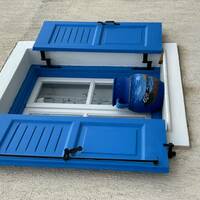 Jen
Jen This transcription item is now locked to you for editing. To release the lock either Save your changes or Cancel.
This lock will be automatically released after 60 minutes of inactivity.